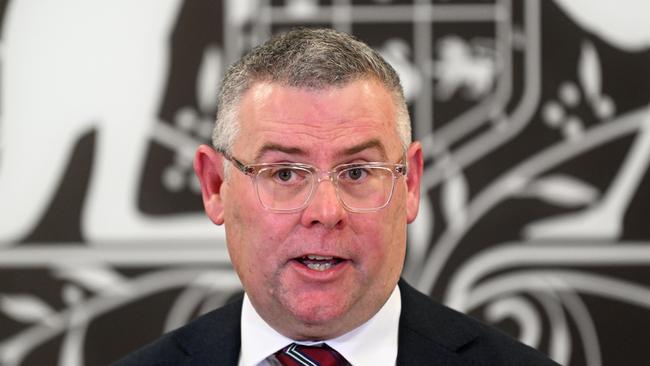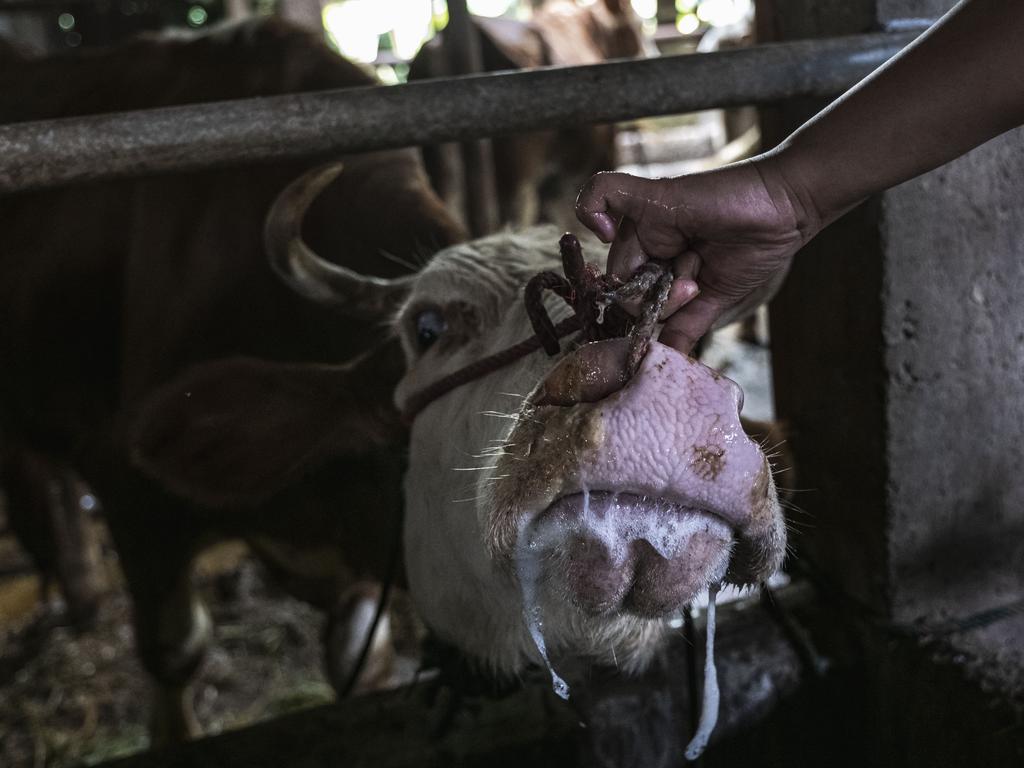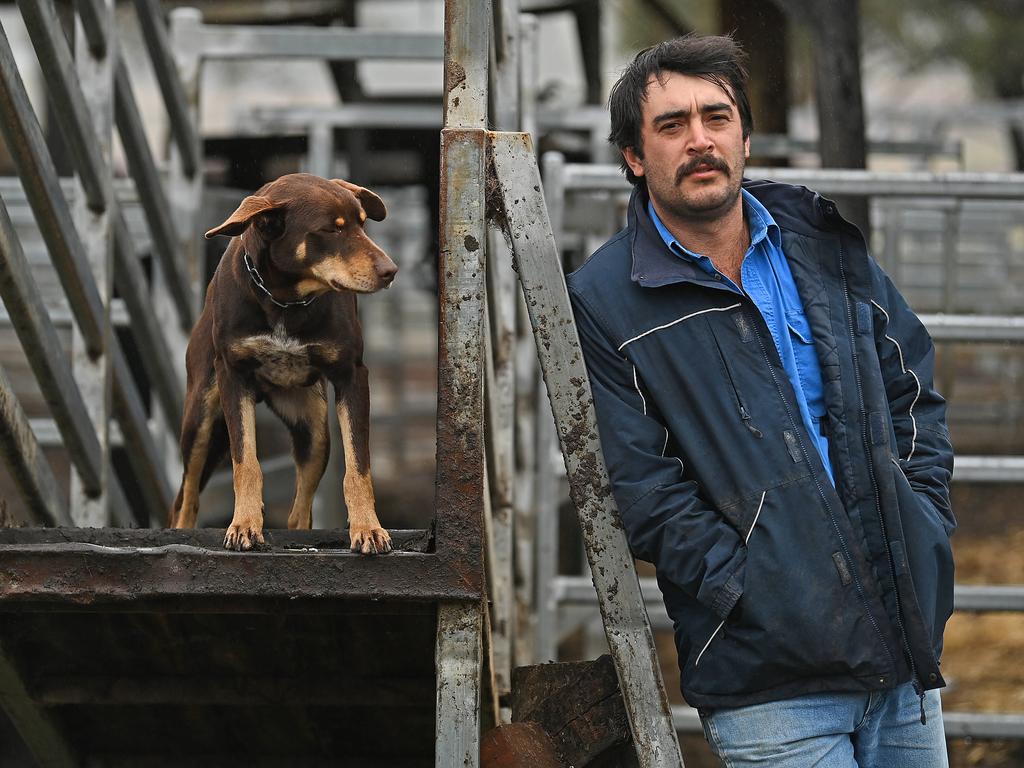Border race to keep out cattle foot-and-mouth virus
Border officials have been handed sweeping biosecurity powers at airports to keep out foot-and-mouth disease and avoid a $80bn wipe-out of the livestock industry.

Australian border officials have been handed sweeping biosecurity powers at airports to keep foot-and-mouth disease out of the country and avoid a $80bn wipe-out of the livestock industry as Indonesian authorities appear to have lost control of the virus.
With the disease spreading to 22 Indonesian provinces, Agriculture Minister Murray Watt invoked powers on Friday to allow border force officials to order travellers to remove their shoes or walk over sanitation mats as they return from hotspots such as Bali.
Indonesian authorities confirmed Bali had been placed among its highest priorities as they battled to contain the virus in Java and Sumatra.
Australian farmers are calling on the government to ramp up tracing systems to swiftly contain and eradicate local outbreaks.
The Albanese government is ready to execute a national strategy to combat any local outbreaks of the highly-contagious virus, which would cripple Australia’s lucrative cattle, sheep, goat and pig exports.
Cattle farmers said that it could take three years to recover from a local foot-and-mouth outbreak and re-establish record levels of international livestock trade.
Senator Watt said increased biosecurity powerswere needed because “some travellers were not doing the right thing when returning from Indonesia”.
“These zones strengthen and widen the powers of biosecurity officers to direct passengers to use foot mats and other biosecurity control measures such as the cleaning of shoes,” he said.
Senator Watt would not declare a “threshold” at which time the government would ban flights from Indonesia despite calls from the opposition and some farmers.
“Scare mongering and fanning the flames of genuine concern does nothing to help our $80bn agriculture industry stay strong and retain its strong international reputation,” he said.
Anthony Albanese is receiving regular updates on the situation and the government’s response to the potential agricultural and economic crisis, which is expected to dominate the return of parliament on Tuesday.
Opposition Leader Peter Dutton said the Prime Minister must take control of the disease response and elevate the threat as a national security committee priority.
“There’s a herd of about 65 million livestock in Indonesia at the moment, there are about 400,000 cattle that have been identified with the virus. They’ve got 3 million vaccines for the 65 million herd; it’s across 22 provinces and it’s spreading like wildfire,” Mr Dutton said.
Mr Dutton, who received a briefing on the situation this week, said unlike other countries where foot-and-mouth disease has been detected, the Indonesian outbreaks were out of control.
“Given the significant two-way traffic between Bali and Perth and the rest of the country, through Jakarta, into Sydney, Melbourne … this is a very significant issue,” he said.
“If it is detected in one cow, or one livestock, one sheep, or one pig here in Australia, the industry closes down overnight. There are no exports.”
Australian Wagyu Association chief executive officer Matt McDonagh said the government should consider a temporary pause on flights from Indonesia until the virus was brought under control.
“It’s a $80bn problem if we get FMD in Australia, but the government has spent $14m so far on changes. That’s a drop in the ocean,” Dr McDonagh said.
“Anything we could do to limit our risk to that exposure would seem reasonable, all the way through to temporary pausing of travel from Indonesia until Australia could assist Indonesia to get that outbreak under control.”
Dr McDonagh said the $1.5bn wagyu industry, which is based primarily on exports with 90 per cent of products exported, would take around three years to restore trade markets if the disease was detected in livestock.
Australian meat exports to more than 57 markets boomed in June. Asian nations, led by Japan, South Korea and Taiwan, dominated meat exports ahead of the US, Canada, the EU and the Middle East.
National Farmers Federation president Fiona Simson, who urged the Albanese government to screen all passengers arriving from Indonesia, said additional biosecurity funding was needed in the October budget to neutralise current and future threats.
“Whilst it is somewhat controlled in those other countries, and it’s not controlled at all at the moment in Indonesia, although hopefully they are working quickly, the thing is there is still live virus circulating in some of those other countries. There’s always a risk,” Ms Simson said.
AgForce cattle president Will Wilson a fourth-generation cattle producer who runs Calliope Station in central Queensland, said domestic measures to keep the virus out and not political sparring over travel bans must be the focus.
“As beef producers in Australia we need to make sure that when we do get it we don’t take 11 months to eradicate and we’ve got our biosecurity measures spot-on at our front gate,” Mr Wilson said.
“Closing the borders is only banter. And it’s not doing my peers any good because it’s splitting us down the middle and it’s creating a lot of fear and panic. “Whereas if we want to really get prepared … it’s regardless of not if but when … we’ve really got to get everything in line to make sure we are protected.”
Australian chief veterinary officer Mark Schipp, who would lead the nation’s disease outbreak response, has urged livestock owners to contact the national emergency animal disease watch hotline if symptoms are observed in cattle, sheep, goats and pigs, including blisters, drooling and limping.
Livestock would be quarantined and suspected foot-and mouth samples sent to the Australian Animal Health Laboratory in Geelong for immediate diagnosis, which takes about 24 hours to process.
The disease hasn’t been recorded in Australia for more than a century, but there were suspected outbreaks in the 1800s.







To join the conversation, please log in. Don't have an account? Register
Join the conversation, you are commenting as Logout